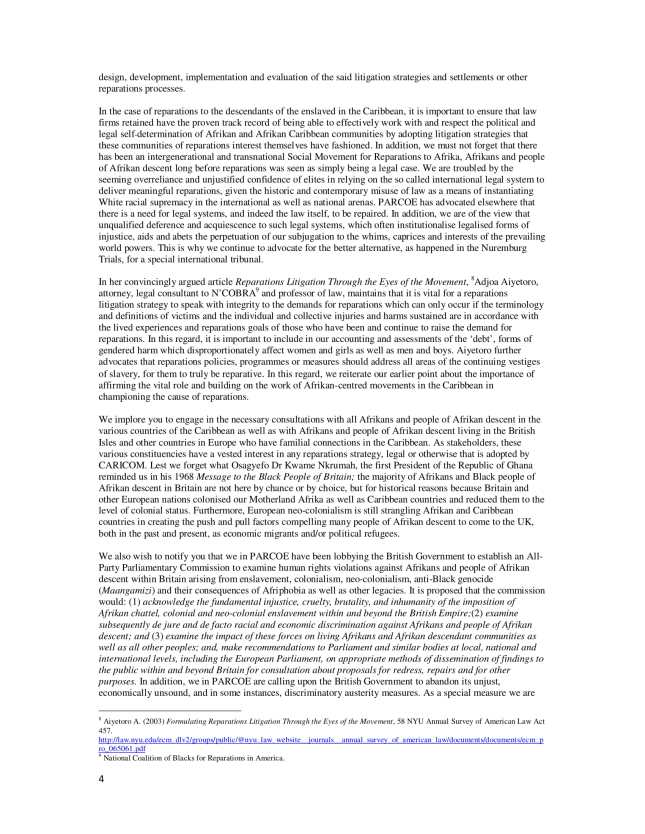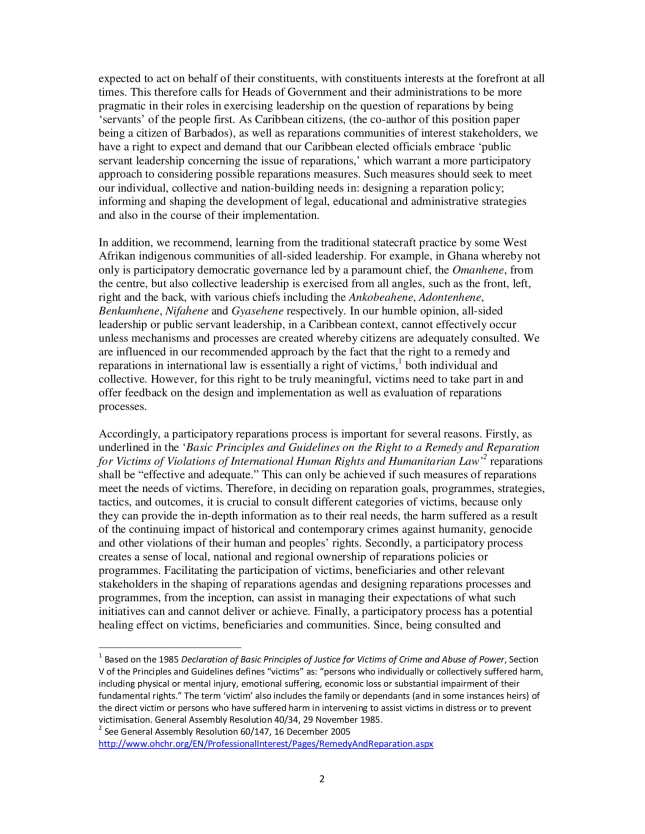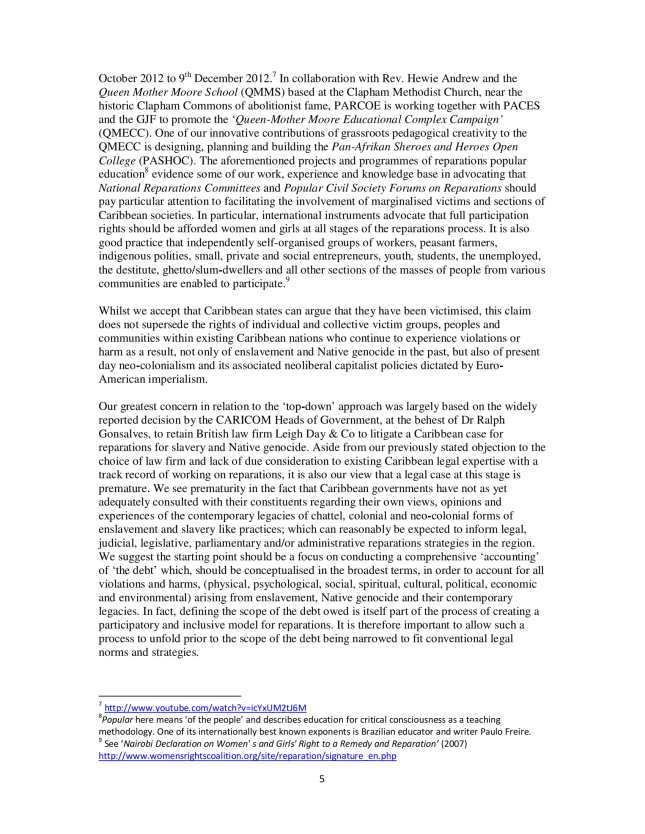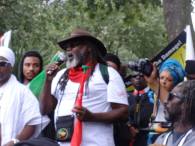“Debate is combat, but your weapons are words”
Melvin B. Tolson (Denzil Washington) in the ‘Great Debaters’
What is the POPSAR?
The People’s Open Parliamentary Session on Afrikan Reparations (POPSAR) at Parliament Square is a mass consciousness-raising forum for public debate and discourse on manifestations of the Maangamizi necessitating Afrikan Reparations which takes place as part of the programme of the annual 1st August, Afrikan Emancipation Day Reparations March. It is a public forum where we rehearse our arguments in pursuit of the ‘battle of Ideas’ on obstacles to the realisation of holistic Reparatory Justice. The purpose of the POPSAR is to engage audiences in action-learning on participatory democratic parliamentary debate and the ‘battle of ideas’ on critical issues such as how to stop various manifestations of the Maangamizi as part of the process of effecting and securing Afrikan Reparatory Justice.
The POPSAR enables the constructive channelling of the ‘battle of ideas’ as an important ideological tool for ascertaining greater clarity as to strategy and tactics for effecting, securing and taking reparations. Within a space where a number of ideological positions struggle for supremacy – reflective of national, ethnic, class and gendered tensions within society – the ISMAR as a revolutionary international social movement cannot neglect the importance of winning hearts and minds and mobilising society around a common reparatory justice vision. Indeed this being one which succeeds in presenting a credible political, social and economic narrative around which the movement seeks to transform hearts and minds to support; which is in itself an alternative to that of the dominant white supremacy racist, capitalist class.
Motion to be debated:
BE IT RESOLVED THAT THE REPARATIONS MARCH, AS A FORM OF REPARATORY JUSTICE STREET PROTEST, IS BEING MADE INADEQUATE DUE TO INACTIVITY BY THE MAJORITY OF ITS PARTICIPANTS IN TAKING STEPS TO ADVANCE THE CAMPAIGN FOR REPARATIONS BETWEEN THE ANNUAL MARCHES.
(The topic is deliberately framed in this way to elicit strong responses to rebut this proposition)
Invited guests will speak for 3 mins for/against.
This POPSAR topic should encourage and inspire intense debate, discussion and dialogue in the lead up to the 2018 March.
Rationale for this topic
Each year guidance as part of the mobilisation for and between the annual marches guidance is provided by the Afrikan Emancipation Day Reparations March Committee (AEDRMC) and its partner the ‘Stop the Maangamzi: We Charge Genocide/Ecocide’ Campaign (SMWeCGEC) on how the campaign for reparations can be advanced, the movement strengthened and suggestions are offered on how to take action. This ranges from ‘shutting down’ Maangamizi crime scenes to organising to bring about the reparatory justice changes one desires, to creatively using the ‘Stop the Maangamizi!’ Petition to galvanise action to address various manifestations of the Maangamizi as the first step to repairing and redressing the harm (reparations) to lobbying elected officials to take specific actions towards the establishment of an All-Party Parliamentary Commission of Inquiry for Reparatory Justice (APPCITARJ).
It cannot be said that the organisers of the March in partnership with the SMWeCGEC have not in various ways outlined a plan for the types of action that people can be taking between the annual Marches. Even the flyers that were put out for the 2017 and 2018 Marches have indicated what steps people can be making. It is also recognised that these are not the only suggestions which have been made.
Nevertheless, the March as the most visible form of protest action in the annual calendar of events, activities and programmes of the UK contingent of the International Social Movement for Afrikan Reparations (ISMAR), is under incredible scrutiny and critique from those who are opposed to marching. For example, from those who feel it is an inadequate tactic or futile endeavour, those who advocate that there are more effective tactics, those who feel that the March and its partner campaign, the SMWeCGEC lacks a ‘meet our demands or else component’ as well as various detractors and naysayers.
It has been argued that whilst a significant number of people attend the Afrikan Emancipation Day Reparations March, these crowds are actually achieving very little in terms of furthering the campaign for reparations. The fervent political and cultural energy experienced by attendees on the ground is hugely disproportionate to the practical results of the March. The main critique of marching seems to be what happens after and between the Marches, the hodgepodge groups and individuals that participate do not necessarily have a commitment to engage in suggested follow-up action which is designed to help build the infrastructure for decision-making and for sustaining momentum between the Marches. Likewise, little is being offered by way of alternatives which people are advocating will yield better results.
This year are throwing the challenge back to you the people to state your case as to what we can and should be doing to improve the March, or what we should be doing instead, hence the topic for the 2018 POPSAR.
What is debating?
Debating involves examining ideas and policies with the aim of persuading people of the validity or futility of the ideas, policies being debated. It allows debaters to: consider and counter different arguments on the nature of the problem or solution being debated; engage with opposing views and to speak strategically.
How do we debate?
In every POPSAR session there is a motion: a statement (the truth or falsehood of which is examined in the debate), idea or policy that is framed and debated with the prefix, ‘This Gathering…’.
There are two sides to the debate, the proposition which supports the motion and the opposition which opposes or challenges it.
How is the POPSAR debate structured?
# of people in the POPSAR: 6
# of people in a team: 3
# of teams in the debate: 2
Duration of the speeches: 3 mins
All each person has to do is stand up and deliver a short speech – perhaps two to four key points they think will convince people to agree with their side of the argument. The speakers will take it in turns – first a speaker from the proposing team (the people who agree with the motion), then the opposing team (the people who disagree with the motion). Each team will have two contributors and the third will do a summary – conclusion.
The first speaker – proposing
The first speaker of the first team will probably introduce what they are going to say, introduce what their team member is going to say, make their own arguments (including answering any questions) and sum up.
If you were proposing (agreeing with) the motion above, as the first speaker you might:
1. Introduce what you are going to say
I am going to discuss …
2. Introduce what your colleague is going to say
My colleague will talk about …
3. Make your own arguments
The speaker will then go on to make these arguments. During this period, the other side will also have a chance to ask up to 2 questions:
Asking a question
At this point, someone from the other side might try to ask a question (we call this offering a ‘point of information’).
If the Speaker allows them to the debater might get to offer a reply
4. Summing up
After the debaters have presented all their arguments and allowed any questions, the next step is to sum up their proposing case – during this bit, the other side aren’t allowed to ask questions:
“So, in conclusion – While my colleague will continue the case by emphasising …., the points I have already made clearly illustrate why this Gathering should vote in favour of the motion…”
The first speaker – opposing
The first speaker against the motion will now start their speech, perhaps by going through the following process:
1. Introduce what they are going to say
“I am going to set out the case against the motion, with my key arguments being:..”
2. Introduce what your colleague is going to say
“My colleague will say…”
3. Respond to first speaker’s arguments
“However, before progressing to my main arguments I would like to take issue with some of the comments made by the first speaker for the proposition. They said that…”
4. Summing up
The first speaker for the opposition then needs to sum up their case.
Second/third speakers
The second/third speaker of the proposition team will now introduce what they are going to say, reflect on what their team member has said, make their own arguments (including answering any questions and responding to what the other team has said) and sum up. Again, the opposition team will do the same.
Although a debate is about making good arguments, it is also about showing you have listened to the other side, understood their arguments, and are willing to challenge them directly.
Floor debate
Once all three speakers for both teams have delivered their speeches, there is a debate from ‘the Gathering’ – this means anyone in the audience can ask a question or make a short speech in favour of one of the sides of the motion.
This part of the debate will last no longer than ten minutes.
Reply speeches
After the floor debate, one speaker from each team gets three minutes to sum up their overall position at the end of the debate. This will include their own arguments and counters to the argument of the other side – and should leave the audience in no doubt as to who is offering the winning side of the case.
After the debate the public gathering decides who was most convincing. Allow for 2-4 points of information from the audience.
What makes a good POPSAR debater?
The audience are invited to judge the debaters on the basis of:
Content: What debaters say and the arguments and examples they use.
Style: How debaters express themselves and the language and voice they use.
Strategy: How well debaters engage with the topic, speak to the motion, respond to other people’s arguments and structure what they say.

Our people have made the mistake of confusing the methods with the objectives. As long as we agree on objectives, we should never fall out with each other just because we believe in different methods, or tactics, or strategy.
Malcolm X
Questions to consider
1. Is the Afrikan Emancipation Day Reparations March (‘The Reparations March’) nothing more than a group of attention seeking people with vague and conflicting messages and objectives on reparations parading through the streets of London begging and complaining?
2. Is the March achieving it’s aims?
3. Is the March succeeding in getting people politically mobilised to hold the British state accountable for its role in the Maangamizi?
4. What factors can increase success in implementation of the aims of the March?
5. What can we as stakeholders do to increase the numbers, diversity of constituencies of Afrikan heritage communities involved in planning, mobilising towards and participating in the March.
6. What work are you doing to help steer the energy galvanised by the March in the direction of political and policy change towards reparatory justice?
7. What role can and should allies play in mobilising for and between the Marches?
8. For those that still say that marching and petitioning, which actually cost us very little risk or harm in Britain today, achieve are a waste of time; what else is it you are prepared to do which you feel will bring about a more favourable response from the British state to our Afrikan Reparatory Justice demands?
9. What other initiatives or activities or protest actions are taking place that will be far more effective in holding the British state and other perpetrators of the Maangamizi to account?
10. What will make the International Social Movement for Afrikan Reparations actually move?
11. What are the methods that will effectively secure and win people of Afrikan heritage reparatory justice?
12. What have you been doing to promote the March or indeed what you may see as more effective alternatives to it?
Guidance on taking action previously put out
Call to Participate in the 2016 Afrikan Emancipation Day Reparations March 2016
https://www.youtube.com/watch?v=wR4ObeZ2QiE
Reparations March 2017: invitation to participate
https://www.youtube.com/watch?v=6U6qzMmtvO8
Reparations March 2017: call to action
https://www.youtube.com/watch?v=as8OjyFrh44
Reparations March 2017: call to mobilise
https://www.youtube.com/watch?v=pubRIzHplnk
SMWeCGEC Petition Update featuring video of AEDRMC Co-Chair Jendayi Serwah ‘Power is only going to respond to power’
https://www.change.org/p/stop-the-maangamizi-we-charge-genocide-ecocide/u/20457629
https://www.change.org/p/stop-the-maangamizi-we-charge-genocide-ecocide/u/21147298
https://stopthemaangamizi.com/2017/08/23/response-from-the-foreign-commonwealth-office-to-the-2017-smwecgec-petition/
Requoting from the 24th August SMWeCGEC Petition Update dated 24th August 2017
Increasingly it is becoming clearer that the British Government will only begin to listen to our Afrikan Reparatory Justice demands, including the demands of the SMWeCGEC when the advocacy, encouragement and support by our Afrikan Heritage Communities in Europe is given to the efforts of our Afrikan Communities of Resistance in Afrika, the Caribbean, other parts of Abya Yala, (the so-called Americas), as well as in Europe to shutting down extractive industries and other foreign corporate crime scenes of the Maangamizi. This is something we stated in the letter to the Prime Minister accompanying the 2017 hand-in of the ‘Stop the Maangamizi!’ Petition. It follows that the plunder of our community resources is still continuing to enrich white power in Britain and European domains of global apartheid across the world. We therefore need to seriously revisit some of the strategies and tactics with which our revered Ancestors fought successful liberation struggles; gaining some concessions that resulted in the official discontinuation of the British Empire, even from inside the brains and belly of the beast of the said Empire!
In fact, it is by pursuing strategies and tactics in Britain that advocated for, encouraged and supported actions of Afrikan people to make the British and other European Empires in Afrika, the Caribbean, Abya Yala as well as Asia ungovernable, which compelled changes in the British Empire, resulting in the proclamations of independence of our current nations states in Afrika and the Caribbean. A similar outcome and impact can be brought about again in our lifetime with the shutting down of Maangamizi crimes scenes in Afrika, the Caribbean, other parts of Abya Yala and Europe.
For those that still say they are not for petitioning or Marching, which actually cost us very little risk or harm in Britain today, what else is it you are prepared to do which you feel will bring about a more favourable response from the British state to our Afrikan Reparatory Justice demands?
The honestly critical discussion and reasoning that should flow from these perspectives of ours in the SMWeCGEC is something that we urge is carried out in Afrikan Heritage Communities not only in the UK, but throughout Europe, Afrika, Abya Yala and other parts of the world. We further urge that this is also done against the background of the historical legacies and the contemporary manifestations of the still ongoing Maangamizi as outlined in the ‘Stop the Maangamizi!’ Petition.
‘Take Action’ tab on the ‘Stop the Maangamizi!’ website
https://stopthemaangamizi.com/take-action/
After 4 years of marching what has been achieved?
https://stopthemaangamizi.com/2017/08/07/after-4-years-of-marching-what-has-been-achieved/
After the 2017 Reparations March: what next?
https://stopthemaangamizi.com/2017/08/05/after-the-reparations-march-what-next/
2017 POPSAR Topic
‘Black on Black Violence’: Why are we not doing enough to stop this manifestation of the Maangamizi?
Debating the motion: This gathering believes that we as Afrikan Heritage Communities are not doing what is necessary to stop this manifestation of the Maangamizi.
Please note: The topic was deliberately framed in this way to elicit strong responses to rebut this proposition.
Rationale for this topic
Micro-sites inter-personal violence between persons of Afrikan heritage communities, are not isolated manifestations. Instead, they are extensions of macro-state processes of violence. In other words, we must read inter-personal violence against men, women, children and young people of Afrikan heritage as part of the continuum of the state’s racialized, gendered, sexualized violence against Afrikan heritage communities. This is about showing the state’s complicity in ongoing intra-community violence which is in itself a ground for reparatory justice for those living today.
For further info about the 2018 Reparations March see here.

























































